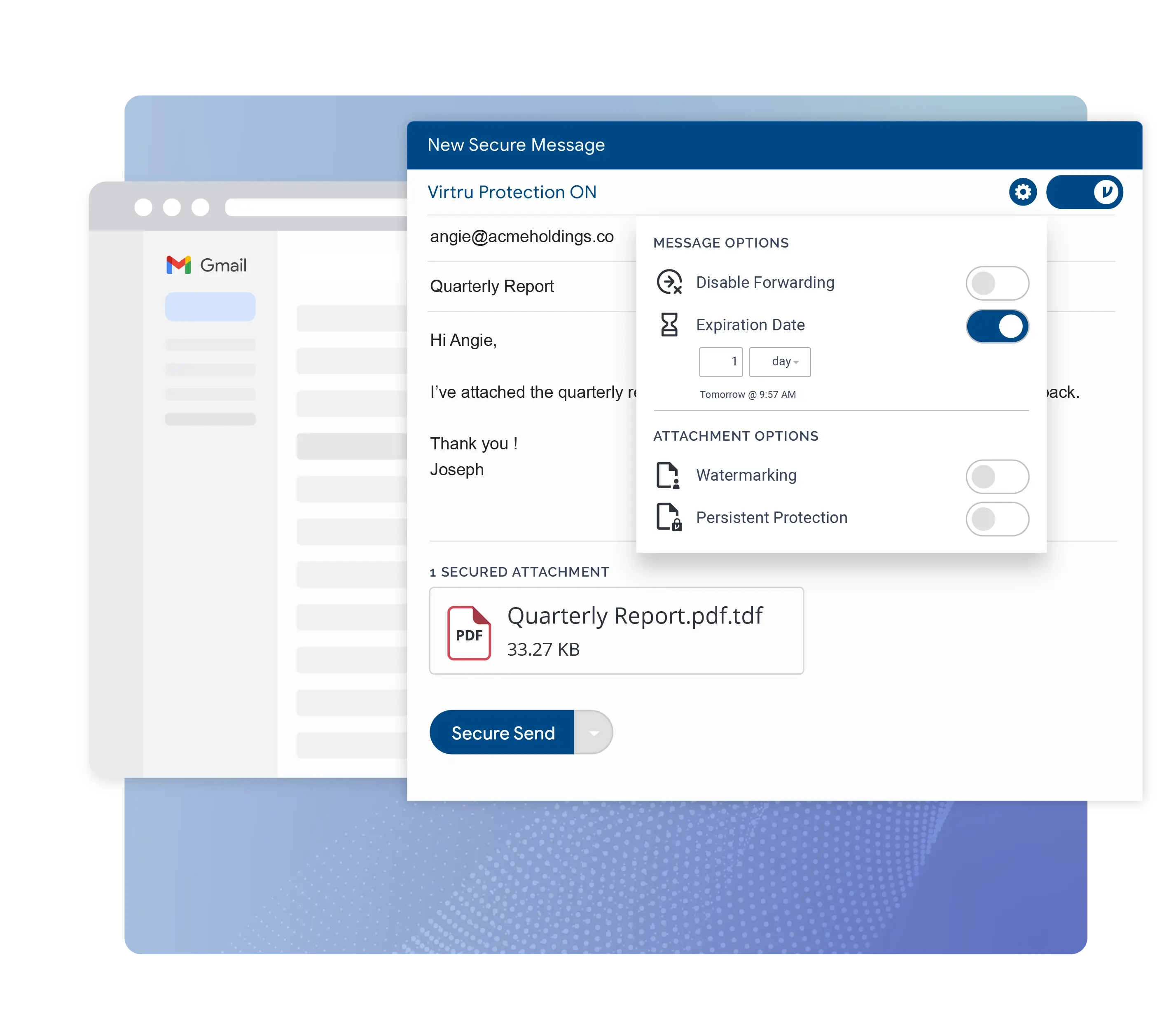Deploy Virtru to Support FTC Safeguards Compliance with Encryption
Virtru’s easy-to-use data security solutions help organizations strengthen compliance and control over customers' financial data.
Virtru’s Zero Trust data encryption protects customer data in transit and at rest, equipping organizations to comply with evolving FTC regulations.
The Federal Trade Commission (FTC) Safeguards Rule requires financial institutions under FTC jurisdiction to have measures in place to keep customer information secure.
The FTC Safeguards Rule outlines encryption as a way to strengthen the security of customer data. Rule 314.4 (c) (3) states: "In order to develop, implement, and maintain your information security program, you shall... Protect by encryption all customer information held or transmitted by you both in transit over external networks and at rest."
The Safeguards Rule applies to "financial institutions” over which the Commission has rulemaking authority pursuant to section 501(b) of the Gramm-Leach-Bliley Act. View the FTC's guidelines for more information on whether your organization falls under the FTC Safeguards Rule.
/Product-Auto-Dealership.webp)
/Product-Mortgage-Lender.webp)
/Product-Secure-Share-Tax-Request.webp)

/Product-Auto-Dealership.webp)
/Product-Mortgage-Lender.webp)
/Product-Secure-Share-Tax-Request.webp)

Virtru’s easy-to-use data security solutions help organizations strengthen compliance and control over customers' financial data.
Virtru’s email encryption layers into the business applications you already use, so your teams won't have to change their workflows to protect sensitive data. Plus, Virtru works with your existing Google and Microsoft credentials, so there are no new passwords to create (or remember).
Learn MoreMake it easy for clients to securely send their financial information — like loan applications, tax forms, Know Your Customer information (KYC), and paystubs. Just put a link to Virtru Secure Share on your website or in your email signature, and clients can easily submit encrypted files in a way that gives them confidence and control.
Learn MoreThe Virtru Data Protection Gateway runs behind the scenes, server-side, to automatically detect and protect sensitive information flowing in and out of your business through email and SaaS apps like Salesforce, Zendesk, and many more.
Learn MorePayment Card Industry (PCI) data security standards apply to those who accept or process payment cards. That includes protecting stored cardholder data as well as encrypting the transmission of cardholder data across open, public networks. It also requires maintaining a policy that addresses information security for employees and contractors.
The Gramm-Leach-Bliley Act requires financial institutions (including insurance providers) to safeguard customer information by developing, implementing, and maintaining a comprehensive information security program, one element of which is to “protect by encryption all customer information held or transmitted by you both in transit over external networks and at rest,” wherever feasible.
Largely aligned with the National Institute of Standards and Technology (NIST) recommendations for cybersecurity, FINRA evaluates firms’ cybersecurity and risk management processes to ensure customer data is protected. According to FINRA, it “assesses a firm’s ability to protect the confidentiality, integrity, and availability of sensitive customer information.”
The Consumer Financial Protection Bureau underscores the need to comply with GLBA, particularly as it relates to transparently communicating privacy practices to consumers.
Additional resources on all things FTC Safeguards security.

Breaks down the components of the rule and make them actionable for your organization.

With Virtru, Kunes emails are encrypted no matter where they travel or are stored.

What consumer finance providers need to know.
6,100 CUSTOMERS TRUST VIRTRU FOR DATA SECURITY AND PRIVACY PROTECTION.




Contact us to learn more about our partnership opportunities.